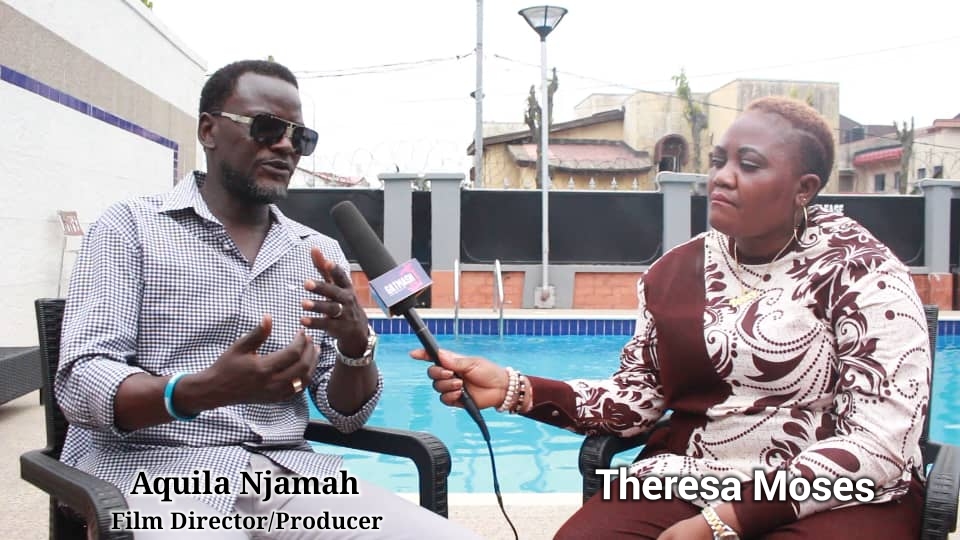The Nigerian film industry popularly known as Nollywood is globally recognized as the second largest film producer in the world and has contributed to Nigeria’s Gross Domestic Product (GDP). Making a career as a film maker requires a lot of determination, resilience, versatile and be constructive in the way you perceive life. International Award Winning Director and Producer, Aquila Njamah shares his insights and experience as one of such film maker well known for his creativity. One of his classic film “The Rivals” showed at the New York International Film and Video Festival in 2007 won him his first ever international award – Best Director.

In an exclusive interview with Theresa Moses, Nollywood actor, creative film director, producer and CEO, Eagle Eye Multimedia and Global Entertainment Limited (EEMGEL) reveals turning points in his career, teenage fantasy, challenges, Nollywood economic impact to Nigeria, COVID-19 Pandemic and more. Excerpt…
How do you earn a living and sustain a career doing what you love in Nigeria?
I think I will answer that question on a personal note, so I don’t get to speak for other people. I’ve always as a child believes that I was going to grow up into a profession I have passion for whatever am doing. For me passion driven first and foremost; I always see myself through telling stories, writing stories and making those stories come to life through movies, documentaries and its likes. So earning a living doing what am doing is not just a matter of survival but also fun and an interesting aspect of my life that’s working to fulfillment.

How has it been doing work in this industry especially Nigeria?
Entertainment industry is no different from any other industry with challenges. We have our ups and downs; we’ve always been striving to develop the industry to meet up with our international counterpart. It’s not like film making originated from Africa or Nigeria, I’d like to say is a borrowed culture but it’s also a medium where we can express ourselves, tell our own stories. Film making goes beyond just feature movies, we also talk about documentaries, television programmes etc. It’s a medium for expression, for one to express themselves. Our challenges are off course naturally one will say finance, the need to expand the schools we have and take the professionals more seriously. Am talking about the government coming in. we already have some private institutions that are supporting.
The business is growing bigger by the day and its bringing in revenues already and the government can see that it’s bringing in revenue. I’d say it will be wiser for them to support the industry by creating an atmosphere where people can take the profession a little more serious. People go to school, we have National Film Institute, Jos but we need to have it in all the six geopolitical zones of the country and taking it up seriously having multinationals come in to fund. Already as it is, the world is looking at us. You rightly said the second largest; yes. If our government can tap into that and say wow you people are doing this good. We’ve been recognized globally as the second largest movie industry, what are they waiting for. They should swing into action and do the needful. If I remember clearly, during President Goodluck Jonathan’s regime, he brought out grants to support the industry – Nollyfund, which was laudable. It’s an industry that has created job opportunity in thousands of ways for people; from distributors to retailers to people printing jackets. Now we are talking about cinemas, staff working in the cinema houses, people selling tickets etc.
When you have a venture like that, a serious government will take it seriously and do something about it and support it to cut down on tariffs etc just to encourage film makers. It’s difficult for people to go out there and outsourced for money and does movies. You want to give loans to film makers and you’re taking about from 23 -28% interest rate, who does that? How is that person supposed to shot a movie and get returns after you have to pay your distributors, actors, virtually everything, you pay for publicity and start servicing your loans? A certain kind of loan that the government can give out maybe one digit per cent interest rate; it will be paid. What am trying to say in essence is that they should take it more seriously; they should go into it and help the industry grow knowing that the industry is a major source of revenue for the nation as a whole.
The Nigerian film industry is a potential goldmine, has the government tapped into it yet?

It’s not just a potential goldmine; it’s proven itself over time to be an untapped goldmine. The goldmine is there, we are seeing it. What am afraid is going to happen, as it has always happened in our country. We don’t support our own until the foreigners come in and start tapping. And that’s about to happen right now. I was in a conference meeting recently, devoid of mentioning any names though. But those guys are coming in already because it’s untapped. They have a way of seeing these things before we do. So they are coming in and when they do, they will take over. It happened in other industries where we have the Lebanese coming into the country, we have the Chinese people coming in. They come in and take over and we start depending on them. We have what it takes to propel this industry to add to the internally generated revenue of the country but the government will always seat and wait for a miracle to happen. Saying they can sustain it by ourselves, let the foreigner investors come in; it’s bad.

As a film maker, I speak for myself and couple of my colleagues that strives to do the things we do by ourselves, we outsourced for the money to do our own movies, promote the movie, you then think of marketing your movie outside the country when we have all it takes. What stops the government from having government owed cinema houses, slashed tickets rate to people in rural areas not been able to go to cinemas? That’s a project am trying to put together, how to take these movies down to the people in rural areas. They can’t pay N2, 000, N2, 500 or N3, 000 to just go see a movie. So what stops the government from having gorilla cinemas? It’s still revenue generated for content providers. If I know my movies is going to be exhibited nationwide in major cinema houses and I also knowing I stand a stance of benefiting. No matter how little it is, from the rural areas which off course we know in terms of numbers are more. These are places we expect them to come into. These are places where you can show your movies for N300, N200 per head to help the people and expand the business. I think it’s an existing goldmine that’s visible, you can see it but some people are having their eyes wide shut to realizing that it’s out there; having the need to do something about it.
Nollywood has contributed over 2.3% to Nigeria Gross Domestic Product (GDP) yet government is not looking into the industry, it is political?

If you say political, I’d probably say it’s possible. I believe that some certain people in some certain position are trying not to tell the truth. They have a reason not to want to question or look towards that direction and do the needful and invest. Its more than that, we are looking at almost 5.5%. Take for instance, if it wasn’t doing that well, we are not going to have people still investing in cinema houses. Going by the statistics we have on ground, it far more than that, also, knowing that we don’t really have an actual data base to check this. But from the little we’ve gathered, we have seen that it’s well over 2.3%.
What project are you working on currently?
Right now we are grading in Italy. It’s a movie called ‘Cold Still’. I commenced that movie like three years ago. But no thanks to COVID-19, we ought to have hit the cinema with the movie right now because of social distancing etc. we’ve kept it in the cooler and working on something else which I won’t let out of the bag in giving out the tittle yet. Right now we are having a script conference over a new movie about to film. Am not filming it in Lagos but in Jos, Plateau state.
How has COVID-19 pandemic affected the movie industry in Nigeria?
Like I said, for my movie to still be in the cooler is COVID-19. It has affected us in different ways, negatively and positively. The negative aspect of it is that a huge sector of the entertainment industry film wise is on hold, social distancing, a lot of restrictions right now. You can’t allow people go to the cinemas. That aspect is sleeping for now so to speak. But it also opened other avenues that during the lockdown, lots of people were looking up online to request for video on demand. That has opened that aspect of the industry which we are hoping that the distributors so to speak will take advantage of that and also increase the wages of content providers. I see them as taking advantage of that and not giving back in return. If everybody is on hold for instance I get frustrated and I say I can’t wait for the cinemas to open anymore, let me have my movie on the hub, may be Netflix, Viva, be that as it may, is like shooting myself on the leg. It’s just a chance am willing to take. We don’t know when the COVID-19 pandemic or crisis so to say will ease off in Nigeria. But it has made us realise that there are other ways we can survive other than the regular way. It has opened our eyes to couple of things we’ve not seen in the past years. At the same time, it just goes to show that we need to suffer a little bit and sacrifice a little bit for things to get better. I think there’s a positive light at the end of the tunnel. For the things to come back for a better, it might take time but will come back and would have broaden our kaleidoscope, how we perceive things business wise, even our creative intuition would have woken to a new dawn. We need to start thinking differently, we need to start thinking what it’s going to happened again, what if something close to this is going to happen again, how do we face it, how do we survive it. I think it has ups and downs, negative and positive aspect but at the end of the day, I think we are going to scale through.
What’s ahead of the industry?
That’s a very though one to answer because there’s a whole lots of uncertainty right now given the pandemic. There’s a whole lots of uncertainty, it’s difficult to be in a platform and be constructive at this particular point in time because we don’t know where things are headed. We can only say anything for certain after the pandemic. Right now we don’t know if we are going for the vaccine or not. A whole lot of things are taking our mind away from reality of where we are. There are a lot of restrictions right now. Until we get out of this period or era, then we can say for certain what the future will hold. Right now it just for us to be hopeful and strive to survive and keep been creative. We have more materials right now. So after the pandemic a lot of script writers will have a lot of things to write about. Life is a continuous process and film making is no difference from that. We just need to continue until we see the light at the end of the tunnel.

What is that thing you do every day that’s essential to your career?
I eat (Laughs). Off course not. Basically to my career, I endeavour very much to be constructive in everything I do. I take life very seriously because as a film maker, as a creative person, your environment is part of what you do. Every day of your life is what you do. Like I said, am involve in a script conference. Had to insist that we have that script conference; its helping us develop stories. Keeping fit, endeavour to be very vast in every aspect of every sphere of life, be constructive in a way you perceive life, the way you judge things and character. I try to be as original as I can every day in every aspect of my life. Add that quality to my work as a film maker. That’s how I survive every day and I attribute it to my work to make that difference.
If you aren’t into film industry what would you be doing?
Growing up my folks wanted me to study law. As a kid I used to winning argument a lot, very argumentative, inquisitive etc. I don’t think that’s what I would have wanted for myself to be a lawyer or attorney…No. But I guess that was a child fantasy influenced by my parents though. Maybe I would have been a professional chef or so. I don’t know but it would have been something that has to do with creativity.
At what point did you think you wanted to be a film maker?
When I got to that aspect in secondary school where you need to decide where you are going to be –a science, art or commercial student. I remember this very vividly, as clear as it happened some hours ago. I walked into the science class, there were a whole lots of funny, quite people. I just don’t even fit in, because we had a week to decide. I went to the commercial class, I still just didn’t see myself fitting in but when I walked into the art class, just few meters away from the door, I felt at home and had that smile that’s going from chin to chin and I was like, this is home. I think it was a life changing experience for me. That moment, it was there I started to decide what aspect of the arts I wanted to major in. that aspect changed my life. Growing up as a child I’ve always loved the movies, I love watching movies. I started up as child star late in the 80’s – 1987. I didn’t know I was going to take it as a profession but it’s something that has been always been inside of me. I believed I just followed my instinct and eventually I studied dramatic art, had a couple of international conferences, international training out of the country etc. it was basically, art inclined to movies making and that’s how it’s been for me and that how my story has been till date basically.
To be continued…..
Share your story or I Witness Reports with us 24/7 via: SMS: +234 (0)9076248001
Whatsapp: +234(0)8072022024, Email: [email protected], follow us on our social media platform. Subscribe to our YouTube: Gatmash TV. Gatmash Blog is one of the most sought- after news portals, with increasing audience, exclusive breaking news and reports across the globe. Plus more. Website: www.gatmash.com
For advert placement, contact us today via email: [email protected] or call our hotlines on Tel: +234(0)9076248001





